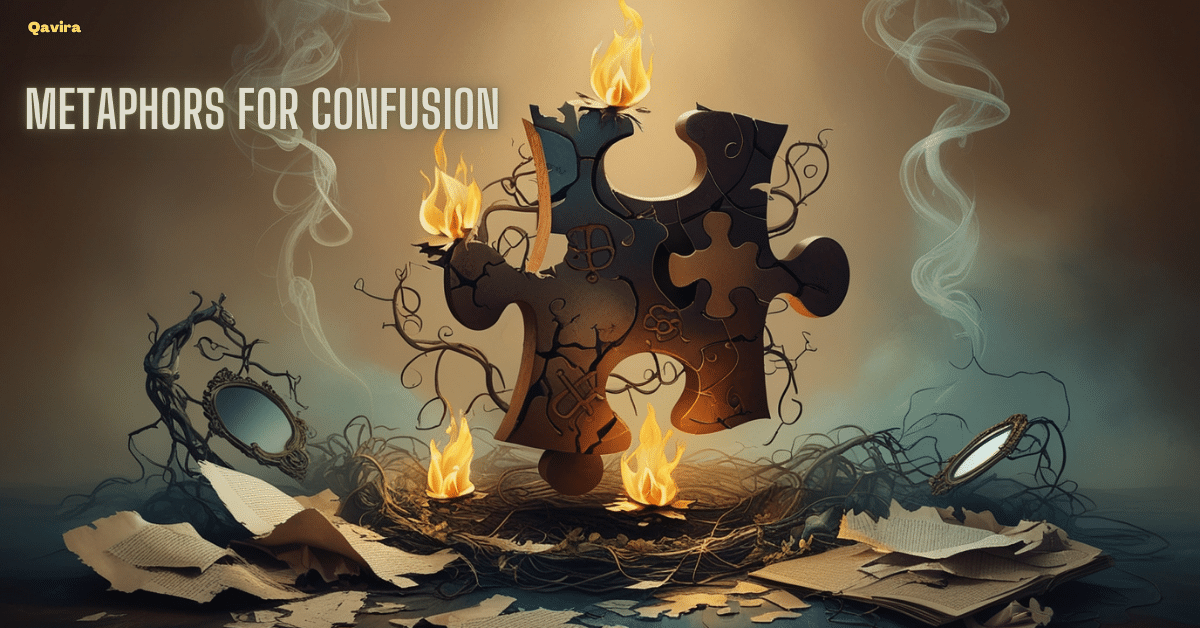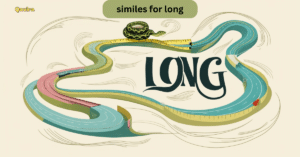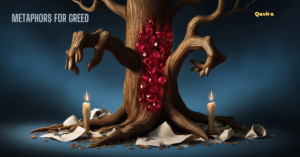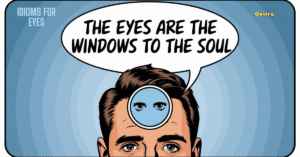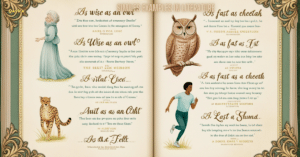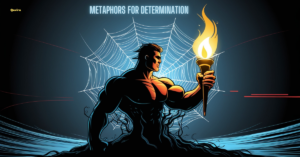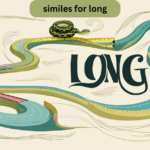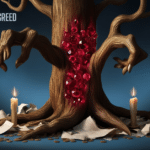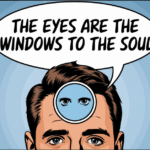Metaphors for confusion can turn your tangled thoughts into vivid imagery that resonates deeply. Have you ever felt lost in a maze of uncertainty, struggling to find clarity? You’re not alone. Confusion is a universal experience, and the right metaphors can help you express those feelings in relatable terms.
In this article, we’ll explore 55 powerful metaphors that capture the essence of confusion, making it easier for you to articulate those baffling moments in life. Whether you’re navigating a tricky situation or simply trying to make sense of your emotions, these metaphors will provide you with the language you need. Let’s dive in!
Metaphors for Confusion
1. A Foggy Day
- Meaning: This metaphor suggests an unclear or indistinct situation where things are difficult to see or understand.
- In a Sentence: “Trying to make sense of the new policy felt like navigating through a foggy day.”
- Other Ways to Say: Cloudy thinking, murky waters, unclear vision.
2. A Maze
- Meaning: A maze represents a complex and confusing situation where finding a way out is challenging.
- In a Sentence: “Her thoughts were like a maze, twisting and turning with no clear exit.”
- Other Ways to Say: A labyrinth, a tangled path, a confusing puzzle.
3. Swimming in Circles
- Meaning: This metaphor conveys the idea of making no progress despite continuous effort, often due to confusion.
- In a Sentence: “After hours of discussion, we were just swimming in circles without a solution.”
- Other Ways to Say: Going in circles, spinning wheels, treading water.
4. A Jigsaw Puzzle
- Meaning: This metaphor illustrates confusion as a collection of pieces that don’t seem to fit together.
- In a Sentence: “Understanding the project felt like trying to complete a jigsaw puzzle without the picture.”
- Other Ways to Say: A fragmented view, incomplete picture, scattered pieces.
5. Lost in the Woods
- Meaning: Being lost in the woods symbolizes a feeling of disorientation and uncertainty in navigating a situation.
- In a Sentence: “When the instructions changed, I felt completely lost in the woods.”
- Other Ways to Say: Off the beaten path, wandering aimlessly, directionless.
6. A Dark Tunnel
- Meaning: A dark tunnel represents a situation where one feels trapped and unable to see a way forward.
- In a Sentence: “After receiving the news, it felt like I was stuck in a dark tunnel with no light ahead.”
- Other Ways to Say: In the shadows, blind alley, without a guide.
7. A Spinning Top
- Meaning: This metaphor conveys a sense of being dizzy or disoriented, as if one’s thoughts are whirling uncontrollably.
- In a Sentence: “Her thoughts were a spinning top after the unexpected announcement.”
- Other Ways to Say: Whirling dervish, dizzying thoughts, chaotic mind.
8. Chasing Shadows
- Meaning: This metaphor suggests pursuing something elusive or intangible, often leading to confusion.
- In a Sentence: “He felt like he was chasing shadows, trying to grasp what was truly happening.”
- Other Ways to Say: Pursuing phantoms, following mirages, grasping at straws.
9. A Broken Compass
- Meaning: A broken compass symbolizes the loss of direction and guidance in a confusing situation.
- In a Sentence: “After the meeting, my plans felt like a broken compass, leading me nowhere.”
- Other Ways to Say: Directionless, adrift, lost at sea.
10. A Twisted Road
- Meaning: This metaphor represents a complex path filled with unexpected turns, making progress difficult.
- In a Sentence: “The project’s requirements felt like a twisted road with no signposts.”
- Other Ways to Say: A winding path, convoluted journey, circuitous route.
11. A Shattered Mirror
- Meaning: This metaphor illustrates a fragmented understanding of a situation, where clarity is lost.
- In a Sentence: “Her recollections of the event were like a shattered mirror, reflecting only bits and pieces.”
- Other Ways to Say: Distorted view, fragmented perspective, unclear reflection.
12. A Cloud of Bees
- Meaning: This metaphor compares confusion to a swarm of bees, creating chaos and distraction.
- In a Sentence: “The overwhelming feedback felt like a cloud of bees buzzing around my head.”
- Other Ways to Say: A whirlwind of thoughts, buzzing chaos, chaotic swarm.
13. A Tangled Yarn
- Meaning: A tangled yarn signifies a situation that has become complicated and knotted, making it hard to unravel.
- In a Sentence: “Her explanation was a tangled yarn that left everyone more confused.”
- Other Ways to Say: A knotted mess, tangled web, complex thread.
14. A Puzzled Frown
- Meaning: This metaphor conveys an expression of confusion, as if the person is trying to solve an enigma.
- In a Sentence: “He wore a puzzled frown as he tried to decode the instructions.”
- Other Ways to Say: A furrowed brow, bewildered expression, confused look.
15. A Faded Map
- Meaning: A faded map symbolizes unclear guidance in navigating a confusing situation.
- In a Sentence: “Without clear objectives, our strategy felt like a faded map with no landmarks.”
- Other Ways to Say: Blurred vision, unclear direction, lost map.
16. A Whirlwind
- Meaning: This metaphor illustrates a chaotic situation that spins out of control, leading to confusion.
- In a Sentence: “The sudden changes in plans created a whirlwind of confusion in the team.”
- Other Ways to Say: A storm of thoughts, chaotic flurry, tumultuous event.
17. A Blank Canvas
- Meaning: A blank canvas represents a lack of ideas or direction, leading to confusion about how to proceed.
- In a Sentence: “When brainstorming began, I felt like I was staring at a blank canvas.”
- Other Ways to Say: Empty slate, unfilled page, undefined space.
18. A Muddled Mind
- Meaning: This metaphor describes a cluttered and confused state of thinking, making it hard to focus.
- In a Sentence: “After the long meeting, her thoughts were a muddled mind, struggling to find clarity.”
- Other Ways to Say: Cloudy thinking, unclear thoughts, jumbled ideas.
19. A Winding River
- Meaning: A winding river symbolizes a convoluted path through confusion, with many unexpected turns.
- In a Sentence: “Navigating the new software felt like traveling down a winding river.”
- Other Ways to Say: A meandering path, circuitous journey, twisting stream.
20. A Shifting Sand
- Meaning: This metaphor reflects instability and uncertainty, as if the ground beneath one’s feet is unreliable.
- In a Sentence: “Her beliefs felt like shifting sand, constantly changing without warning.”
- Other Ways to Say: Unstable ground, unpredictable foundation, uncertain footing.
21. A Fuzzy Picture
- Meaning: A fuzzy picture indicates a lack of clarity or understanding about a situation.
- In a Sentence: “The details of the project were a fuzzy picture, making it hard to grasp the overall goal.”
- Other Ways to Say: Blurred image, unclear vision, indistinct view.
22. A Discombobulated Mind
- Meaning: This metaphor describes a state of confusion and disarray in thinking processes.
- In a Sentence: “After the unexpected news, she felt like her mind was completely discombobulated.”
- Other Ways to Say: Out of sorts, in disarray, thrown off balance.
23. A Confetti Storm
- Meaning: A confetti storm symbolizes chaos and confusion, with bits and pieces flying everywhere.
- In a Sentence: “The brainstorming session turned into a confetti storm of ideas that left us all bewildered.”
- Other Ways to Say: Chaotic mix, scattered thoughts, explosion of ideas.
24. A Knotted String
- Meaning: A knotted string signifies complexity and confusion, where resolution seems difficult.
- In a Sentence: “Her explanation was a knotted string, making it hard to follow her point.”
- Other Ways to Say: Tangled mess, complex knot, intertwined threads.
25. A Lost Key
- Meaning: This metaphor suggests that something essential is missing, leading to confusion and frustration.
- In a Sentence: “Understanding the concept was like searching for a lost key to unlock the mystery.”
- Other Ways to Say: Missing piece, hidden answer, essential element.
26. A Fuzzy Line
- Meaning: A fuzzy line indicates blurred boundaries between concepts or ideas, leading to confusion.
- In a Sentence: “The rules of the game had a fuzzy line, making it difficult to determine what was allowed.”
- Other Ways to Say: Gray area, unclear boundary, indistinct separation.
27. A Chaotic Symphony
- Meaning: This metaphor illustrates confusion as a mix of sounds and ideas that don’t harmonize.
- In a Sentence: “The conflicting opinions created a chaotic symphony that drowned out clear communication.”
- Other Ways to Say: Discordant noise, clashing sounds, disorganized melody.
28. A Tangled Web
- Meaning: A tangled web signifies a complex situation that is difficult to navigate and understand.
- In a Sentence: “The conflicting reports created a tangled web that was hard to unravel.”
- Other Ways to Say: Complicated mess, intricate network, confusing snarl.
29. A Puzzle with Missing Pieces
- Meaning: This metaphor represents a situation where not all information is available, leading to confusion.
- In a Sentence: “Trying to solve the problem felt like a puzzle with missing pieces.”
- Other Ways to Say: Incomplete picture, fragmented understanding, lacking clarity.
30. A Labyrinth of Thoughts
- Meaning: This metaphor depicts a complex mental state where one’s thoughts are lost and scattered.
- In a Sentence: “His mind was a labyrinth of thoughts, making it hard to focus on one idea.”
- Other Ways to Say: Twisted thinking, convoluted ideas, maze of concepts.
31. A Clouded Mind
- Meaning: A clouded mind symbolizes confusion and lack of clarity in thinking.
- In a Sentence: “After the long day, her thoughts were clouded, making it hard to concentrate.”
- Other Ways to Say: Foggy brain, unclear thoughts, hazy mind.
32. A Sinking Ship
- Meaning: This metaphor represents a situation that is failing or rapidly deteriorating, leading to confusion.
- In a Sentence: “The project felt like a sinking ship, with everyone scrambling to figure out what to do next.”
- Other Ways to Say: Going down in flames, out of control, rapidly failing.
33. A Wandering Mind
- Meaning: A wandering mind indicates difficulty focusing, often leading to confusion about the task at hand.
- In a Sentence: “During the lecture, I had a wandering mind that made it hard to absorb the information.”
- Other Ways to Say: Distracted thoughts, drifting focus, meandering ideas.
34. A Shifting Maze
- Meaning: A shifting maze represents an ever-changing situation that complicates understanding and direction.
- In a Sentence: “The evolving requirements felt like a shifting maze that kept us on our toes.”
- Other Ways to Say: Moving puzzle, dynamic challenge, changing landscape.
35. A Baffling Riddle
- Meaning: This metaphor symbolizes a situation that is puzzling and difficult to interpret or understand.
- In a Sentence: “The new regulations were a baffling riddle that left everyone scratching their heads.”
- Other Ways to Say: Confounding puzzle, perplexing question, enigmatic problem.
36. A Floating Balloon
- Meaning: A floating balloon signifies a lack of control over one’s thoughts or emotions, leading to confusion.
- In a Sentence: “After the unexpected news, my thoughts felt like a floating balloon, drifting aimlessly.”
- Other Ways to Say: Unmoored ideas, detached thoughts, wandering emotions.
37. A Shattered Vase
- Meaning: This metaphor represents a situation that is broken and difficult to piece back together.
- In a Sentence: “After the argument, our friendship felt like a shattered vase, fragile and confusing.”
- Other Ways to Say: Broken trust, fragmented relationship, damaged connection.
38. A Whirl of Confetti
- Meaning: This metaphor suggests a chaotic burst of ideas or emotions that are difficult to manage.
- In a Sentence: “The brainstorming session turned into a whirl of confetti, with ideas flying everywhere.”
- Other Ways to Say: Chaotic explosion, scattered thoughts, disorganized ideas.
39. A Mysterious Fog
- Meaning: A mysterious fog symbolizes uncertainty and obscured understanding in a situation.
- In a Sentence: “The lack of communication created a mysterious fog around the project’s goals.”
- Other Ways to Say: Thick haze, unclear atmosphere, hidden truths.
40. A Disarrayed Closet
- Meaning: This metaphor represents a situation that is messy and confusing, lacking organization.
- In a Sentence: “Her schedule felt like a disarrayed closet, with no clear plan in sight.”
- Other Ways to Say: Chaotic arrangement, cluttered space, jumbled mess.
41. A Swaying Branch
- Meaning: A swaying branch symbolizes instability and uncertainty in a confusing situation.
- In a Sentence: “His confidence felt like a swaying branch, unsure of where to lean.”
- Other Ways to Say: Wobbling foundation, unsteady ground, shifting support.
42. A Muffled Sound
- Meaning: A muffled sound indicates a lack of clarity or understanding, making it hard to grasp what is being communicated.
- In a Sentence: “The instructions came through like a muffled sound, leaving everyone confused.”
- Other Ways to Say: Hushed voice, unclear message, muted communication.
43. A Fuzzy Memory
- Meaning: A fuzzy memory signifies a lack of clarity in recalling details, leading to confusion.
- In a Sentence: “The event was a fuzzy memory, making it hard to remember what actually happened.”
- Other Ways to Say: Blurred recollection, hazy past, indistinct remembrance.
44. A Whimsical Dream
- Meaning: This metaphor suggests that thoughts are scattered and nonsensical, leading to confusion.
- In a Sentence: “The brainstorming session turned into a whimsical dream, with ideas that made no sense.”
- Other Ways to Say: Flight of fancy, surreal thoughts, fanciful ideas.
45. A Hazy Vision
- Meaning: A hazy vision represents a lack of clear insight into a situation, leading to confusion.
- In a Sentence: “His plans for the future felt like a hazy vision, unclear and uncertain.”
- Other Ways to Say: Blurred outlook, indistinct view, unclear perspective.
46. A Chaotic Canvas
- Meaning: A chaotic canvas symbolizes a situation filled with conflicting ideas that create confusion.
- In a Sentence: “The group’s input turned into a chaotic canvas, each member painting a different picture.”
- Other Ways to Say: Disordered artwork, mixed messages, clashing ideas.
47. A Shifting Sand Dune
- Meaning: This metaphor represents a situation that is unstable and constantly changing, leading to confusion.
- In a Sentence: “The project’s requirements felt like a shifting sand dune, impossible to grasp.”
- Other Ways to Say: Unstable foundation, fluid situation, changing landscape.
48. A Complicated Dance
- Meaning: A complicated dance symbolizes a confusing interplay of actions and reactions.
- In a Sentence: “Navigating the office politics felt like a complicated dance with no clear steps.”
- Other Ways to Say: Intricate choreography, tangled movements, confusing rhythm.
49. A Hidden Treasure
- Meaning: This metaphor suggests that understanding is buried beneath layers of confusion, waiting to be discovered.
- In a Sentence: “Finding the solution felt like searching for a hidden treasure in a sea of confusion.”
- Other Ways to Say: Buried insight, concealed clarity, undiscovered knowledge.
50. A Broken Clock
- Meaning: A broken clock symbolizes a lack of reliability in understanding time or events, leading to confusion.
- In a Sentence: “His sense of timing felt like a broken clock, always off and confusing.”
- Other Ways to Say: Irregular timing, unreliable schedule, distorted perception.
51. A Blurred Line
- Meaning: A blurred line indicates that boundaries are unclear, leading to confusion about what is acceptable.
- In a Sentence: “The nature of their relationship had a blurred line, making it hard to define.”
- Other Ways to Say: Ambiguous boundary, indistinct separation, unclear distinction.
52. A Chaotic Storm
- Meaning: A chaotic storm represents intense confusion and turmoil in a situation.
- In a Sentence: “The unexpected changes created a chaotic storm that left everyone disoriented.”
- Other Ways to Say: Turbulent upheaval, fierce turmoil, wild disturbance.
53. A Confused Map
- Meaning: A confused map signifies unclear directions or guidance, leading to confusion about how to proceed.
- In a Sentence: “His plans felt like a confused map, lacking clear routes to follow.”
- Other Ways to Say: Misleading directions, unclear guidance, distorted path.
54. A Tangled Garden
- Meaning: A tangled garden symbolizes a situation that has become overgrown and chaotic, making it hard to navigate.
- In a Sentence: “The project’s goals felt like a tangled garden, with too many competing priorities.”
- Other Ways to Say: Overgrown mess, chaotic landscape, disordered space.
55. A Faint Whisper
- Meaning: A faint whisper indicates a lack of clarity or understanding, making communication difficult.
- In a Sentence: “The instructions were a faint whisper, barely audible over the noise of confusion.”
- Other Ways to Say: Soft voice, muted words, unclear message.
Quiz on Metaphors for Confusion
1. What does the metaphor “A Foggy Day” represent?
A) Clarity
B) Uncertainty
C) Joy
Answer: B) Uncertainty
2. Which metaphor signifies a complex situation with no clear exit?
A) A Jigsaw Puzzle
B) A Straight Path
C) A Clear Sky
Answer: A) A Jigsaw Puzzle
3. “Swimming in Circles” means:
A) Making progress
B) Repeating efforts with no advancement
C) Enjoying a swim
Answer: B) Repeating efforts with no advancement
4. What does “A Tangled Yarn” signify?
A) Simplicity
B) Complexity and confusion
C) A clear plan
Answer: B) Complexity and confusion
5. The metaphor “A Broken Compass” suggests:
A) Clear direction
B) Lack of guidance
C) Enhanced understanding
Answer: B) Lack of guidance
6. “Lost in the Woods” symbolizes:
A) Feeling at home
B) Disorientation and uncertainty
C) Clear navigation
Answer: B) Disorientation and uncertainty
7. Which metaphor describes a chaotic burst of ideas?
A) A Floating Balloon
B) A Whirl of Confetti
C) A Calm Sea
Answer: B) A Whirl of Confetti
8. “A Shattered Mirror” represents:
A) A clear reflection
B) Fragmented understanding
C) A beautiful image
Answer: B) Fragmented understanding
9. What does “A Clouded Mind” indicate?
A) Sharp clarity
B) Confusion and lack of focus
C) Enhanced concentration
Answer: B) Confusion and lack of focus
10. “A Muddled Mind” is best described as:
A) Organized thinking
B) Clarity of thought
C) A cluttered and confused state
Answer: C) A cluttered and confused state
conclusion
In exploring the 55 metaphors for confusion, we uncover the rich language that captures the complexities of feeling lost and bewildered. Each metaphor, from “a foggy day” to “a tangled yarn,” paints a vivid picture of disorientation and uncertainty. These expressions not only help us articulate our experiences but also foster a shared understanding of the human condition. By using these metaphors, we can more effectively communicate our feelings of confusion, making it easier to navigate the intricate paths of life together.

Carla Jones is an expert blogger in English Language Teaching, sharing innovative strategies and insights to empower educators and enhance language learning experiences for students worldwide.
